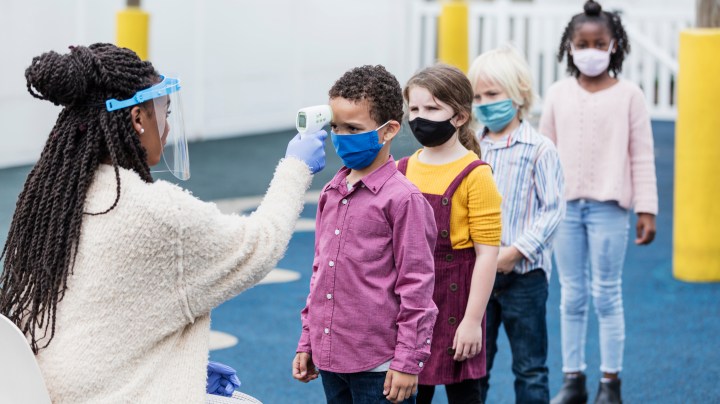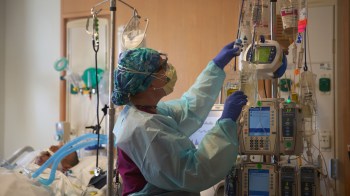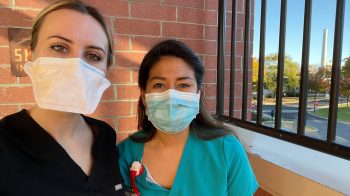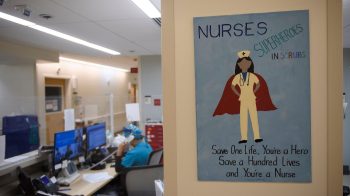
School nurses are stretched thin during the pandemic
School nurses are stretched thin during the pandemic

As Cameron Traut sits at her desk, the phone rings, a walkie-talkie goes off, and she jumps in to help when she hears a student might need an EpiPen for an allergy.
Traut is a school nurse at Libertyville High School in Chicago’s northern suburbs. She said this kind of activity is typical for a school nurse. She has predictable tasks, like giving students scheduled medications, and then unpredictable emergencies that occur on a daily basis. But this year, as the pandemic continues, school nurses have a second job juggling all the COVID-19 mitigations.
“A lot of times, I will end up having to take work home that I can’t get done during the day,” Traut said. “I’ve shifted everything at home to be able to complete the reports that are due for the meeting tomorrow.”
Traut said the extra work of COVID testing and contact tracing is necessary to keep kids in class as much as possible. But it’s a major undertaking for school nurses.
Traut considers herself fortunate that her district hired more nurses, but she said she could always use more help. Many schools didn’t have enough support before the pandemic and are struggling even more so now.
Schools have taken on a big job this year protecting students from COVID-19 in order to continue with full-time in-person learning. A lot of mitigation efforts like testing and contact tracing have fallen on school nurses.
Staffing issues are drawing attention to a long-standing problem of nurse understaffing and the longtime goal of having a nurse in every school, said Bridget Heroff, the president-elect of the Illinois Association of School Nurses. The more support school nurses have, Heroff and others say, the better they’re able to focus on other student needs that have built up during the pandemic.
“I know there’s a lot of nurses who are not taking lunches, and they go home and they just continue to work at home, on the weekends,” Heroff said.
She said some schools have used COVID relief dollars to hire more people or get temporary help from nursing students. In other districts, however, nurses might divide their time between multiple schools — and it’s stretching them thin.

“You’re not really getting a break from the work, which is really unfortunate and can definitely lead to some burnout,” Heroff said.
Money isn’t the reason people take the job, said Linda Mendonca with the National Association of School Nurses. School nurse salaries average $10,000 to $15,000 less than other nursing jobs. Nurses care about their students and the community, but the pressures brought on by the pandemic have been difficult.
“We’ve heard that nurses who are close to retirement are thinking about it, that the pandemic may have kind of pushed them out,” she said.
Mendonca said that before the pandemic, roughly a quarter of schools in the country did not employ a school nurse at all, while only about 40% employed nurses full time. The pandemic, she said, has at least brought more attention to school nurses.
She points to a bill in Congress that would help more schools hire nurses, especially in vulnerable districts where the school clinic is the only access to health care for some students.
“We are public health out there in the schools and communities, and we offer a lot to our students and staff,” she said.
Mendonca said nurses need support so they can better care for students’ other needs.
Bridget Heroff in Illinois said that more students this year are dealing with mental health issues; some kids missed out on a lot last year when buildings were closed.
“Some of it is playing catch-up and trying to get back into the routines,” she said. “Helping to advocate for what those students need is a huge part of this year.”
The more support and help nurses have, Heroff said, the more they say they can focus on the core of their job: keeping students physically and emotionally healthy.
There’s a lot happening in the world. Through it all, Marketplace is here for you.
You rely on Marketplace to break down the world’s events and tell you how it affects you in a fact-based, approachable way. We rely on your financial support to keep making that possible.
Your donation today powers the independent journalism that you rely on. For just $5/month, you can help sustain Marketplace so we can keep reporting on the things that matter to you.


















